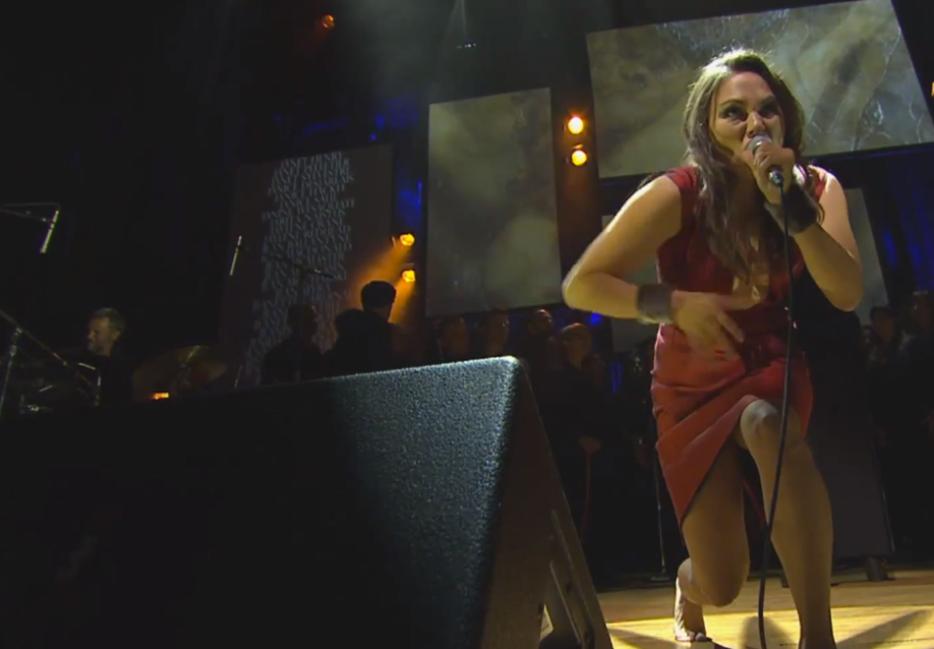“We’re here to honour the best in Canadian science fiction,” as Jay Baruchel introduced last night’s Polaris Music Prize gala. It can be fun and probably healthy to clown on the event, especially to the 200 of us reporters, broadcasters, and critics who determine its annual nominees, but I feel grateful for a glamorous award ceremony where the presenters describe albums shouldering “the weight and violence of masculinity,” or invoke “racialized Canadians” (twice). What defines Canada if not earnestness? And when Tanya Tagaq’s Animism prevailed yesterday, she wasn’t just the first aboriginal winner, but the first person of colour, period—which says something rather less laudatory about this country and its cultural industries.
It’s no secret around here that I adore Owen Pallett’s In Conflict: “An altered state, an eternal dialectic,” in the ardent words of presenter Sarah Liss. But after Tagaq’s note-flaying performance, it would’ve felt silly and deflating for anybody but the Inuk throat singer to win. Her guttural improvisations barrelled through those acoustics at the Carlu, prone to thinning out more delicate or bass-heavy music. Basia Bulat got her fluttering high notes across, but the rapper Shad suffered from a terrible sound mix, and Jessy Lanza struggled until her vocal loops threaded one another like ensnaring fishhooks. Pallett pounded out a memorable version of “The Riverbed” despite it all, although his best contribution last night may have been the introduction for Arcade Fire’s Reflektor, using the unsatisfied reaction to the album as jujitsu; The Suburbs was perfect, yet the “pervert” in him anticipated and admired the “perfectly flawed, unachievable whole” that followed it. “I prayed for Tusk, I prayed for Sandinista, I prayed for Disintegration.”
Drake? Good question. I like how goofy and awkward and abjectly Canadian he is. I like that I can best describe his gender expression as “soft butch.” I like the almost lascivious way he says “mofocka” on “Worst Behavior.” I like hearing “Hold On, We’re Going Home” behind me at the threshold of a crowded bar. I like the fact that he owns a rave shower. I like the resemblance to Littlefoot from The Land Before Time. I like that part in the “Anaconda” music video where he sits there as if Nicki’s ass is weighing all his earthly deeds at the gates of the afterlife. I didn’t like Nothing Was the Same too much—felt Beyoncé put the whole production aesthetic to far better use with “Mine,” found Drake’s good girl / bad girl binary to be approaching Gnostic mysticism in its incomprehensible zeal—but you did again have to wonder when a rap album loved by most rap-savvy critics might win this damn thing. And my girl Carly Rae Jepsen never even got nominated.
I doubt anyone was still pondering that after the final set yesterday, though. The singer-songwriter Geoff Berner described Animism as “the sound of a people defying genocide,” and if Tanya Tagaq foregrounded that history—a video screen named the 1,182 aboriginal women gone missing or murdered since 1980, several dozen Jane Does in agonizing consonance—she refused to become a prisoner of it. You could tell the A&R types there didn’t really know who Tagaq was, were maybe expecting classicist folk art or something. What they got was both the evening’s most avant-garde performance (meaning sounds not yet heard) and the most metal one (meaning head-banging). Her voice pounced from shivery vulnerability to the fearsome tone of command, and eschewing words allowed for a fascinating number of interpretations. I heard Tagaq’s music variously called harrowing, reverent, sexy, and visceral—none of them solitudes, as a gospel singer can show. People wept. Then it was all charming stage banter: “fuck PETA,” and “fuck Stephen Harper,” too. The last I saw, she was at the after-party dancing to “I Want You Back,” another form of advanced language.






